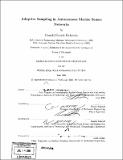Adaptive sampling in autonomous marine sensor networks
Author(s)
Eickstedt, Donald Patrick
DownloadFull printable version (21.12Mb)
Other Contributors
Woods Hole Oceanographic Institution.
Advisor
Henrik Schmidt.
Terms of use
Metadata
Show full item recordAbstract
In this thesis, an innovative architecture for real-time adaptive and cooperative control of autonomous sensor platforms in a marine sensor network is described in the context of the autonomous oceanographic network scenario. This architecture has three major components, an intelligent, logical sensor that provides high-level environmental state information to a behavior-based autonomous vehicle control system, a new approach to behavior-based control of autonomous vehicles using multiple objective functions that allows reactive control in complex environments with multiple constraints, and an approach to cooperative robotics that is a hybrid between the swarm cooperation and intentional cooperation approaches. The mobility of the sensor platforms is a key advantage of this strategy, allowing dynamic optimization of the sensor locations with respect to the classification or localization of a process of interest including processes which can be time varying, not spatially isotropic and for which action is required in real-time. Experimental results are presented for a 2-D target tracking application in which fully autonomous surface craft using simulated bearing sensors acquire and track a moving target in open water. (cont.) In the first example, a single sensor vehicle adaptively tracks a target while simultaneously relaying the estimated track to a second vehicle acting as a classification platform. In the second example, two spatially distributed sensor vehicles adaptively track a moving target by fusing their sensor information to form a single target track estimate. In both cases the goal is to adapt the platform motion to minimize the uncertainty of the target track parameter estimates. The link between the sensor platform motion and the target track estimate uncertainty is fully derived and this information is used to develop the behaviors for the sensor platform control system. The experimental results clearly illustrate the significant processing gain that spatially distributed sensors can achieve over a single sensor when observing a dynamic phenomenon as well as the viability of behavior-based control for dealing with uncertainty in complex situations in marine sensor networks.
Description
Thesis (Ph. D.)--Joint Program in Oceanography/Applied Ocean Science and Engineering (Massachusetts Institute of Technology, Dept. of Mechanical Engineering; and the Woods Hole Oceanographic Institution), 2006. Includes bibliographical references (leaves 209-213).
Date issued
2006Department
Joint Program in Oceanography/Applied Ocean Science and Engineering; Woods Hole Oceanographic Institution; Massachusetts Institute of Technology. Department of Mechanical EngineeringPublisher
Massachusetts Institute of Technology
Keywords
/Woods Hole Oceanographic Institution. Joint Program in Oceanography/Applied Ocean Science and Engineering., Mechanical Engineering., Woods Hole Oceanographic Institution.